
Amira Hass is an Israeli journalist and author, mostly known for her columns in the daily newspaper Haaretz covering Palestinian affairs in Gaza and the West Bank, where she has lived for almost thirty years.

Maus, often published as Maus: A Survivor's Tale, is a graphic novel by American cartoonist Art Spiegelman, serialized from 1980 to 1991. It depicts Spiegelman interviewing his father about his experiences as a Polish Jew and Holocaust survivor. The work employs postmodern techniques, and represents Jews as mice and other Germans and Poles as cats and pigs respectively. Critics have classified Maus as memoir, biography, history, fiction, autobiography, or a mix of genres. In 1992 it became the first graphic novel to win a Pulitzer Prize.
The Holocaust has been a prominent subject of art and literature throughout the second half of the twentieth century. There is a wide range of ways–including dance, film, literature, music, and television–in which the Holocaust has been represented in the arts and popular culture.
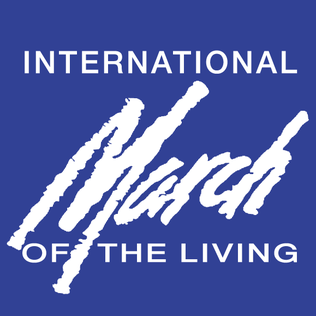
The March of the Living is an annual educational program which brings students from around the world to Poland, where they explore the remnants of the Holocaust. On Holocaust Memorial Day observed in the Jewish calendar, thousands of participants march silently from Auschwitz to Birkenau.

Trina Robbins was an American cartoonist. She was an early participant in the underground comix movement, and one of the first women in the movement. She co-produced the 1970 underground comic It Ain't Me, Babe, which was the first comic book entirely created by women. She co-founded the Wimmen's Comix collective, wrote for Wonder Woman, and produced adaptations of Dope and The Silver Metal Lover. She was inducted into the Will Eisner Hall of Fame in 2013 and received Eisner Awards in 2017 and 2021.

The history of the Jews in Moldova reaches back to the 1st century BC, when Roman Jews lived in the cities of the province of Lower Moesia. Bessarabian Jews have been living in the area for some time. Between the 4th-7th centuries AD, Moldova was part of an important trading route between Asia and Europe, and bordered the Khazar Khaganate, where Judaism was the state religion. Prior to the Second World War, violent antisemitic movements across the Bessarabian region badly affected the region's Jewish population. In the 1930s and '40s, under the Romanian governments of Octavian Goga and Ion Antonescu, government-directed pogroms and mass deportations led to the concentration and extermination of Jewish citizens followed, leading to the extermination of between 45,000-60,000 Jews across Bessarabia. The total number of Romanian and Ukrainian Jews who perished in territories under Romanian administration is between 280,000 and 380,000.

Elazar Stern is an Israeli politician and military general. He was a major general (res.) in the Israel Defense Forces, serving as Head of the Manpower Directorate, commander of the IDF Officers Training School, and Chief Education Officer, as well as a combat soldier and commander in the Paratroopers Brigade. He has served as a Member of Knesset for eight years, first, as a member of the Hatnuah party, and then in 2015 he joined the Yesh Atid, and served as the Minister of Intelligence between 2021 and 2022.
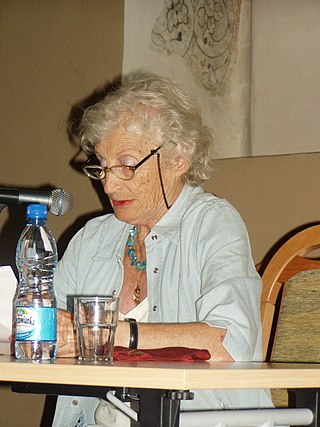
Miriam Akavia also Matylda Weinfeld was a Polish-born Israeli writer and translator, a Holocaust survivor, and the president of the Platform for Jewish-Polish Dialogue.
Antisemitic tropes or antisemitic canards are "sensational reports, misrepresentations, or fabrications" that are defamatory towards Judaism as a religion or defamatory towards Jews as an ethnic or religious group. Since as early as the 2nd century, libels or allegations of Jewish guilt and cruelty emerged as a recurring motif along with antisemitic conspiracy theories.

Ari Folman is an Israeli film director, screenwriter, animator, and film-score composer. He directed the Oscar-nominated animated documentary film Waltz with Bashir (2008) and the live-action/animated film The Congress. He is a member of the Academy of Motion Picture Arts and Sciences.
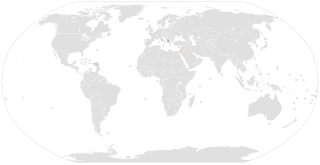
Albania has recognized Israel as a state since April 19, 1949. Diplomatic relations between the countries were established on August 19, 1991. Albania has an embassy in Tel Aviv and Israel has an embassy in Tirana.
Antisemitism in Canada is the manifestation of hostility, prejudice or discrimination against the Canadian Jewish people or Judaism as a religious, ethnic or racial group. This form of racism has affected Jews since Canada's Jewish community was established in the 18th century.

The Melbourne Holocaust Museum (MHM) was founded in Elsternwick, Melbourne, Australia, in 1984 by Holocaust survivors. It is currently Australia’s largest institution dedicated to Holocaust education, research & remembrance. Its mission is to commemorate the six million Jews murdered by the Nazis between 1933 and 1945, and amplify the voices of Holocaust survivors, to inspire a better future free from antisemitism, racism and prejudice.
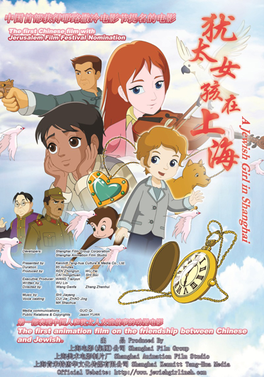
A Jewish Girl in Shanghai is a 2010 Chinese animated family film written by Wu Lin and based on his graphic novel of the same name. It is directed by Wang Genfa and Zhang Zhenhui, and voiced by Cui Jie, Zhao Jing and Ma Shaohua.
I Was a Child of Holocaust Survivors is a 2010 animated film by Ann Marie Fleming based on a 2006 autobiographical graphic novel by Bernice Eisenstein. In the book and its film adaptation, Eisenstein explores her own identity through the experience of her parents, both Auschwitz survivors.
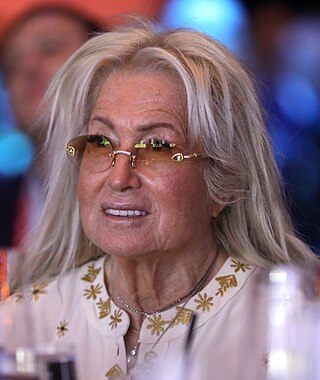
Miriam Adelson is an Israeli-American physician and political donor. She was married to Sheldon Adelson from 1991 until his death in 2021. After his death, she became the owner of the Las Vegas Sands and as of August 2024, is estimated to be the fifth richest woman in America with a net worth of US$30 billion. Adelson is the richest Israeli in the world and the 52nd richest person in the world according to the Bloomberg Billionaires Index, while Forbes places her as the 65th.
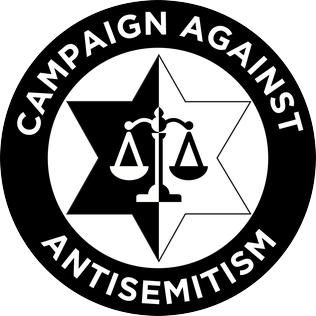
Campaign Against Antisemitism (CAA) is a British non-governmental organisation established in August 2014 by members of the Anglo-Jewish community. It conducts litigation, runs awareness-raising campaigns, organises rallies and petitions, provides education on antisemitism and publishes research.
Miriam Katin is a Hungarian-born American graphic novelist and graphic artist. She worked in animation from 1981 to 2000 in Israel and the United States. She has written two autobiographical graphic novels, We Are on Our Own (2006) and Letting It Go (2013). She has won an Inkpot Award and the Prix de la critique.

Comparisons between Israel and Nazi Germany occur frequently in the political discourse of anti-Zionism. Given the legacy of the Holocaust, the legitimacy of and intent behind these accusations are a matter of debate, particularly with regard to their potential nature as a manifestation of antisemitism. Historically, figures like British historian Arnold J. Toynbee have drawn parallels or alleged a relationship between Zionism and Nazism; British professor David Feldman suggests that these comparisons are often rhetorical tools without specific antisemitic intent. On the other hand, the Anti-Defamation League sees these comparisons as attempts at Holocaust trivialization. French philosopher Bernard-Henri Lévy argues that such comparisons not only lack historical and moral equivalence, but also risk inciting anti-Jewish sentiment.














